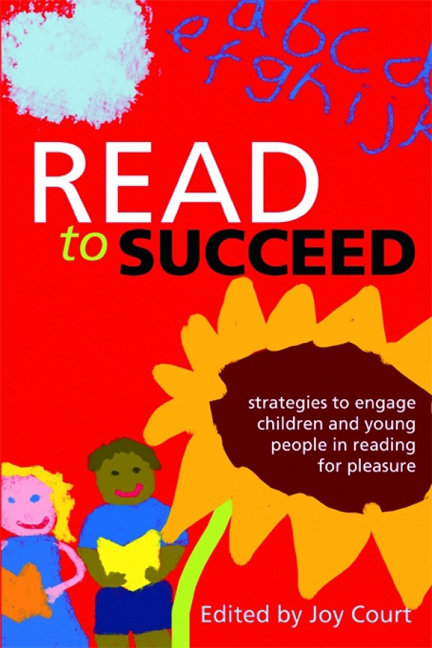Book contents
- Frontmatter
- Dedication
- Contents
- Foreword
- Contributors
- Introduction
- 1 It's never too soon to start
- 2 How children begin to read
- 3 Creating young readers: teachers and librarians at work
- 4 The six dimensions of the ‘honeycomb’ model, and its implications for literacy, libraries and literature in New Zealand
- 5 The Summer Reading Challenge in libraries: a continuing success
- 6 Stockport does Book Idol! A case study linking libraries and schools to inspire reading for pleasure
- 7 There and back again: restoring reading to the classroom
- 8 Promoting excellence: shadowing the CILIP Carnegie and Kate Greenaway Medals
- 9 Choice and motivation: local book awards
- 10 The sport of reading
- 11 Adventures in the book trade: libraries and partnerships
- 12 The hard-to-reach reader in the 21st century
- 13 Creative reading and insideadog.com.au
- Index
- Miscellaneous Endmatter
- Miscellaneous Endmatter
- misc-endmatter
3 - Creating young readers: teachers and librarians at work
Published online by Cambridge University Press: 08 June 2018
- Frontmatter
- Dedication
- Contents
- Foreword
- Contributors
- Introduction
- 1 It's never too soon to start
- 2 How children begin to read
- 3 Creating young readers: teachers and librarians at work
- 4 The six dimensions of the ‘honeycomb’ model, and its implications for literacy, libraries and literature in New Zealand
- 5 The Summer Reading Challenge in libraries: a continuing success
- 6 Stockport does Book Idol! A case study linking libraries and schools to inspire reading for pleasure
- 7 There and back again: restoring reading to the classroom
- 8 Promoting excellence: shadowing the CILIP Carnegie and Kate Greenaway Medals
- 9 Choice and motivation: local book awards
- 10 The sport of reading
- 11 Adventures in the book trade: libraries and partnerships
- 12 The hard-to-reach reader in the 21st century
- 13 Creative reading and insideadog.com.au
- Index
- Miscellaneous Endmatter
- Miscellaneous Endmatter
- misc-endmatter
Summary
Introduction
Every Tuesday, in my local library, there is a gathering of about 60 very young ‘readers’ who, as yet, cannot decode a single printed word but who certainly have all the characteristics of book-lovers. They are members of the Baby Bounce and Rhyme group. Every Friday, there is Story Time for the under-fives. The children listen, laugh, gasp, shout out and are totally absorbed in the narrative and pictures shared with them by the librarian.
Having spent my whole career teaching reading, it is delightful for me to observe events where children are having such a pleasurable introduction to literacy. Whatever may or may not happen in their homes, these children will start school knowing about books, aware of the enthralling power of stories and having had experiences with language in engaging, playful ways. I cannot imagine any teacher or parent thinking that these librarybased activities are just time fillers or entertainment for children. When it comes to preparation for more organized literacy education, few activities could be better than playing with the sounds of English and listening to stories.
The library where the activities take place has always been a good one but, like other public libraries, it is run by an ever-decreasing number of staff, who are enthusiastic and hard working, but unqualified as librarians. Despite this, a library manager has taken on the responsibility of contacting schools, encouraging membership and ensuring that there is a lively children's collection available. For older primary children there are holiday activities, a well-supported Summer Reading Challenge (see Chapter 5) and a Children's Book Award. These book-focused activities keep children interested in reading over the long summer break and let them see that it is not only teachers who promote the pleasures of reading. Librarians and teachers both want the same thing – to help youngsters to become confident, life-long readers. At a time when we are regularly told that standards in reading are not good enough, it would seem an obvious step to capitalize on the skill and support offered to schools by libraries.
- Type
- Chapter
- Information
- Read to SucceedStrategies to Engage Children and Young People in Reading for Pleasure, pp. 29 - 48Publisher: FacetPrint publication year: 2011



